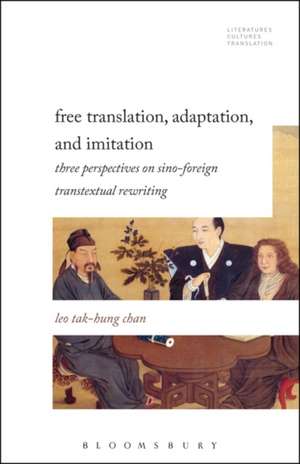Western Theory in East Asian Contexts: Translation and Transtextual Rewriting: Literatures, Cultures, Translation
Autor Professor Leo Tak-hung Chanen Limba Engleză Paperback – 11 noi 2020
| Toate formatele și edițiile | Preț | Express |
|---|---|---|
| Paperback (1) | 173.31 lei 3-5 săpt. | |
| Bloomsbury Publishing – 11 noi 2020 | 173.31 lei 3-5 săpt. | |
| Hardback (1) | 543.36 lei 3-5 săpt. | +24.19 lei 4-10 zile |
| Bloomsbury Publishing – 11 noi 2020 | 543.36 lei 3-5 săpt. | +24.19 lei 4-10 zile |
Din seria Literatures, Cultures, Translation
- 13%
 Preț: 237.28 lei
Preț: 237.28 lei - 8%
 Preț: 151.38 lei
Preț: 151.38 lei - 13%
 Preț: 167.24 lei
Preț: 167.24 lei - 23%
 Preț: 191.56 lei
Preț: 191.56 lei - 23%
 Preț: 193.07 lei
Preț: 193.07 lei - 28%
 Preț: 497.06 lei
Preț: 497.06 lei - 30%
 Preț: 538.77 lei
Preț: 538.77 lei - 14%
 Preț: 190.06 lei
Preț: 190.06 lei - 14%
 Preț: 190.06 lei
Preț: 190.06 lei - 14%
 Preț: 190.06 lei
Preț: 190.06 lei -
 Preț: 308.27 lei
Preț: 308.27 lei - 22%
 Preț: 223.93 lei
Preț: 223.93 lei -
 Preț: 195.56 lei
Preț: 195.56 lei - 28%
 Preț: 496.81 lei
Preț: 496.81 lei - 23%
 Preț: 193.62 lei
Preț: 193.62 lei
Preț: 173.31 lei
Preț vechi: 197.00 lei
-12% Nou
Puncte Express: 260
Preț estimativ în valută:
33.17€ • 34.50$ • 27.38£
33.17€ • 34.50$ • 27.38£
Carte disponibilă
Livrare economică 24 martie-07 aprilie
Preluare comenzi: 021 569.72.76
Specificații
ISBN-13: 9781501327827
ISBN-10: 1501327828
Pagini: 248
Dimensiuni: 140 x 216 x 18 mm
Greutate: 0.72 kg
Editura: Bloomsbury Publishing
Colecția Bloomsbury Academic
Seria Literatures, Cultures, Translation
Locul publicării:New York, United States
ISBN-10: 1501327828
Pagini: 248
Dimensiuni: 140 x 216 x 18 mm
Greutate: 0.72 kg
Editura: Bloomsbury Publishing
Colecția Bloomsbury Academic
Seria Literatures, Cultures, Translation
Locul publicării:New York, United States
Caracteristici
Hong Kong-based author of international reputation writing on the topic of the moment in translation studies: translation and Asian literature and culture
Notă biografică
Leo Tak-hung Chan is Junwu Distinguished Professor at Guangxi University, China. His other scholarly books include Readers, Reading and Reception of Translated Fiction in Chinese (2010), Twentieth-Century Chinese Translation Theory: Modes, Issues and Debates (2004), and One into Many: Translation and the Dissemination of Classical Chinese Literature (2003).
Cuprins
Introduction1.The Transtextual Triad, Similar but Not the SamePart 12. Freely Rendered: Aesop's Fables in Nineteenth-century China3. A Higher Loyalty? The (Ab)uses of Aesthetic Theories of TranslationPart 24. Adaptation Studies through a Translation Lens5. Accommodation and Adaptation-The Case of East Asia6. Boys over Flowers: Localization in a Web of (Re)adaptationsPart 37. The Vicissitudes of Imitatio, Historically8. "New Wine in Old Bottles": Two Sino-Japanese Traditions of Imitation9. Receptive Transcreation: Simulating James Joyce's Narrative Style10. The Aggregate Monkey: Parody and Pastiche in Japanese MangaConclusionAcknowledgments BibliographyIndex
Recenzii
Leo Tak-hung Chan's latest book sets bold new parameters for translation studies by showing how this discipline needs to embed practices of adaptation and imitation at the core of its analysis. Taking this expanded field of translation studies as his point of departure, Chan presents richly intriguing case studies from East Asian writing - from free translations of Aesop's fables to adaptations of contemporary manga to imitations of James Joyce - to show how cultural producers in the Sinosphere have creatively remade their source texts in ways that challenge ascendant theories of translation from the global North. This study will be mandatory reading for scholars and students of translation studies everywhere.
With a breathtakingly erudite range of examples drawn from trans-textual rewritings in East Asia of the past several centuries, Leo Chan's Western Theory in East Asian Contexts offers a very welcome non-European perspective on longstanding debates over the nature and boundaries of translation. Particularly valuable is its nuanced application to East Asian literatures of current theoretical work covering the spectrum of translation, adaptation, and imitation, inter alia. From contemporary Japanese anime and Taiwanese television dramas to literary classics like Ulysses, Aesop's Fables, and Water Margin, Chan repeatedly demonstrates how a holistic approach to the migration of texts across languages and national or cultural boundaries can yield insights that both corroborate and enrich recent theoretical advances in the field of translation studies.
With a breathtakingly erudite range of examples drawn from trans-textual rewritings in East Asia of the past several centuries, Leo Chan's Western Theory in East Asian Contexts offers a very welcome non-European perspective on longstanding debates over the nature and boundaries of translation. Particularly valuable is its nuanced application to East Asian literatures of current theoretical work covering the spectrum of translation, adaptation, and imitation, inter alia. From contemporary Japanese anime and Taiwanese television dramas to literary classics like Ulysses, Aesop's Fables, and Water Margin, Chan repeatedly demonstrates how a holistic approach to the migration of texts across languages and national or cultural boundaries can yield insights that both corroborate and enrich recent theoretical advances in the field of translation studies.
